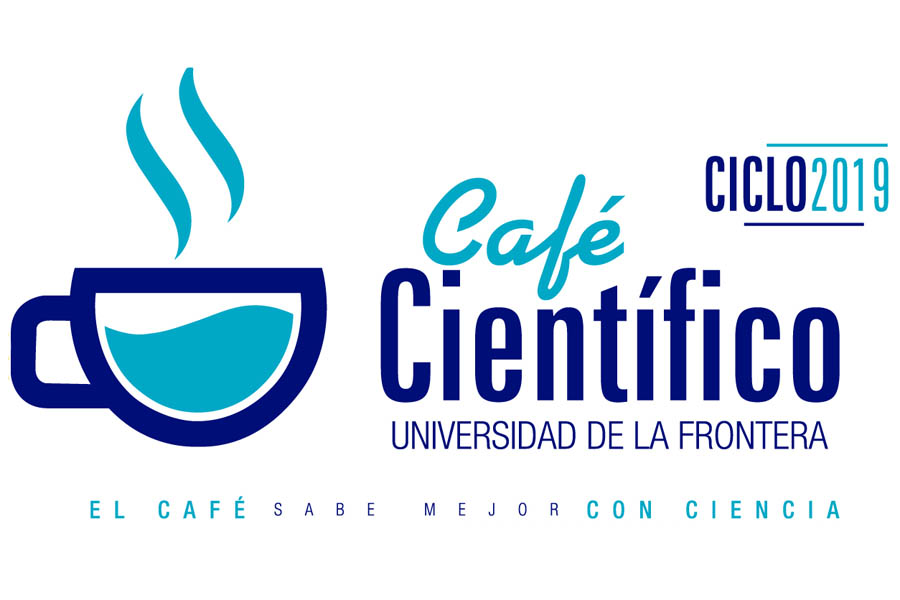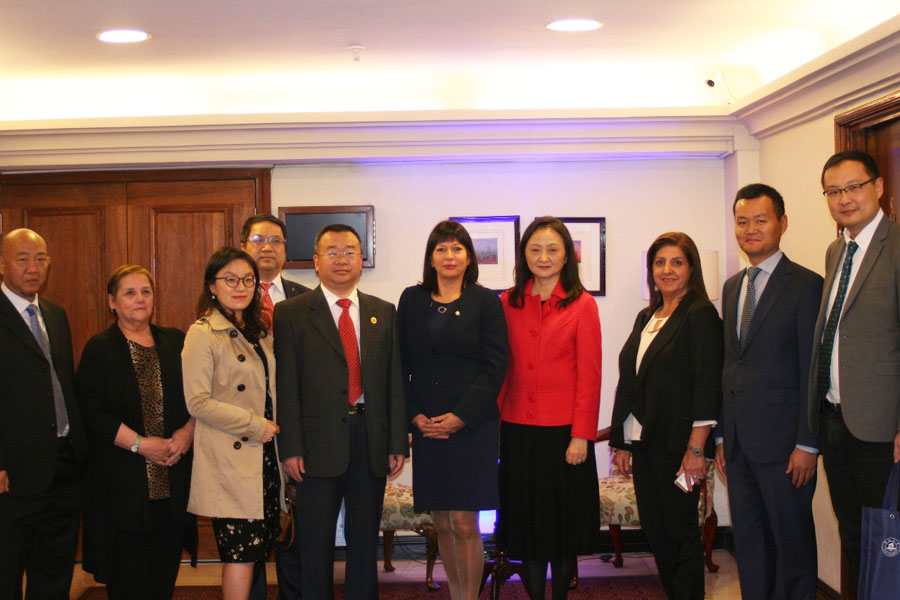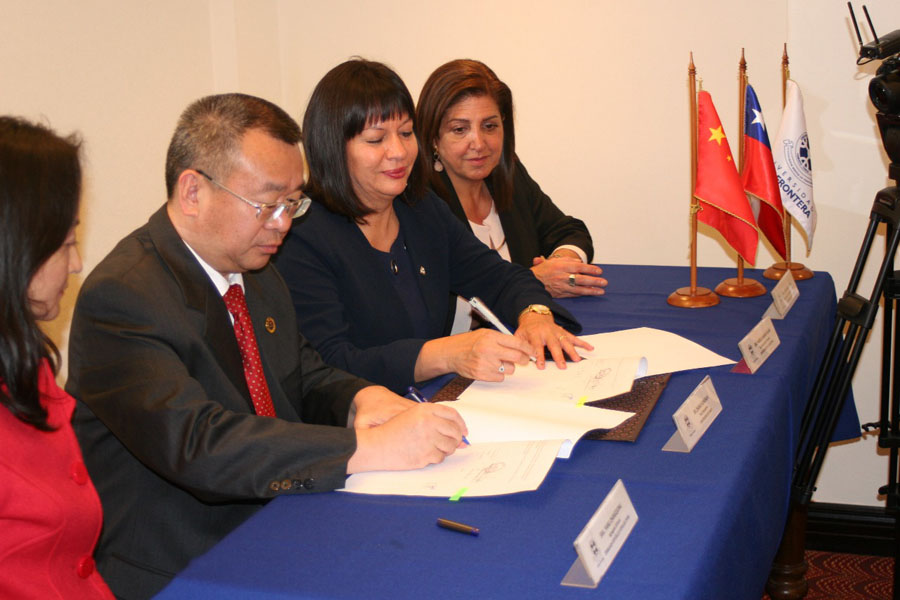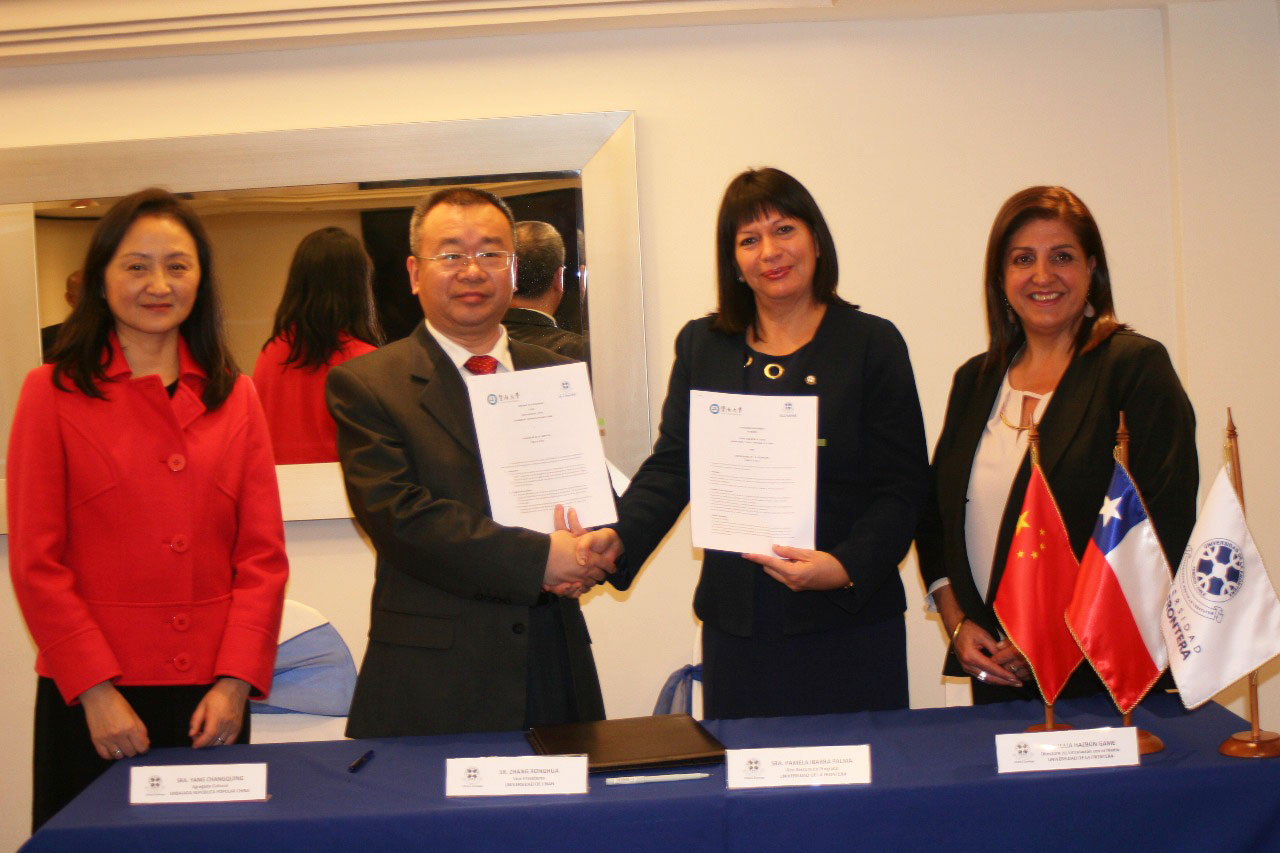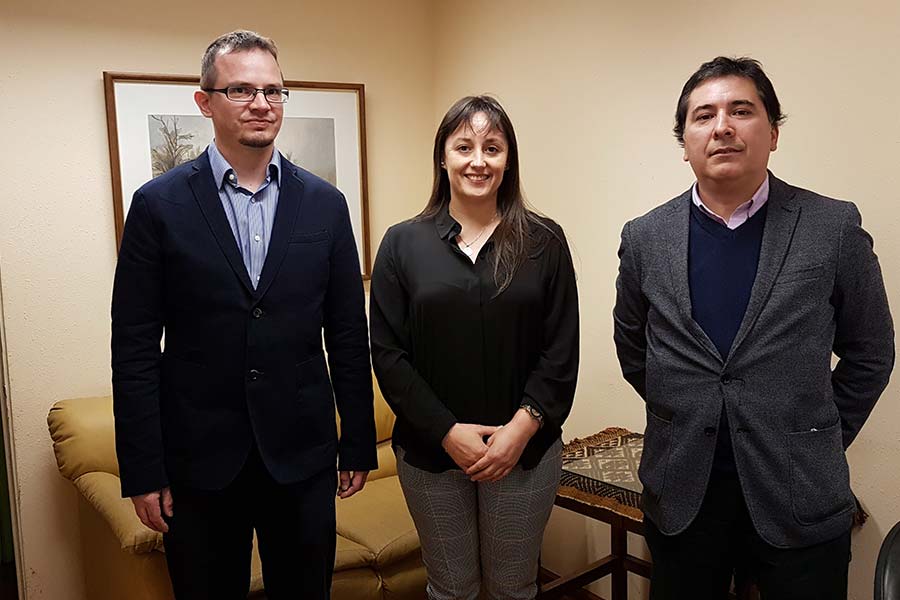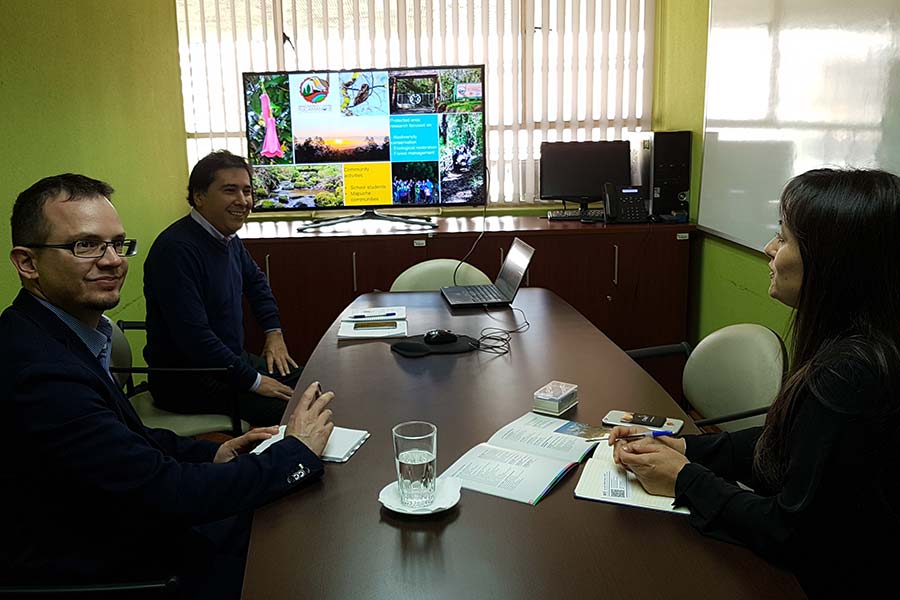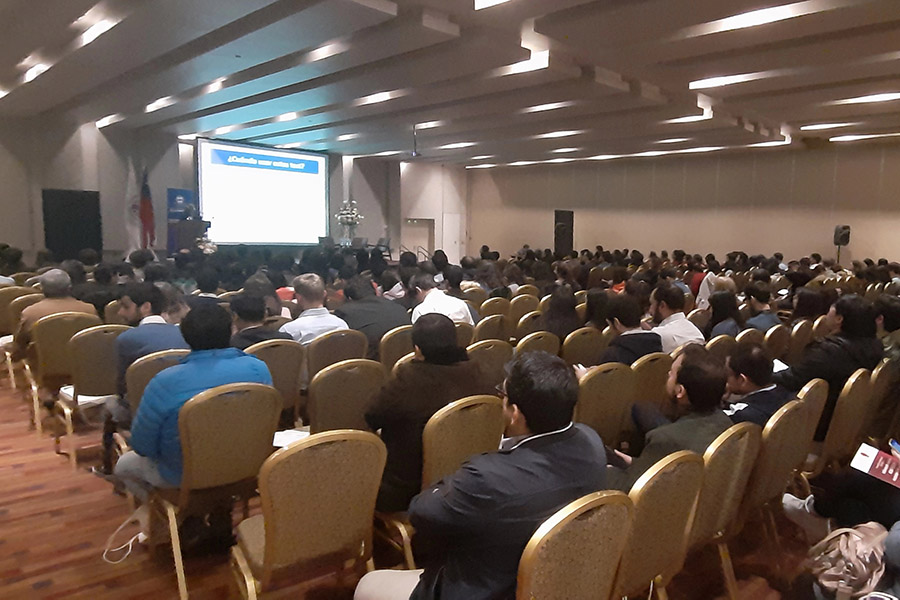|
The Science Cafe (“Café Científico”) of the Universidad de La Frontera started its fourth season on May 7, 2019. |
What started four years ago as a space for the dissemination of science and knowledge has now turned into a well-established activity of the Universidad de La Frontera that started its fourth season with interesting topics of the world of science. “This year, we are starting into a new season of this initiative that started in 2016 as a project to communicate science and that was well received by the university community and external people from the beginning. Over these years, a lot of interesting topics for the community have been presented from a scientific point of view and also turned into an opportunity of support for the community.Science plays an important social role that is not always visible and during the past three years, the Science Cafe of our university allowed thousands of people to participate in science and to be part of science, as well as for the university to show the community which is our scientific contribution,” said Dr. Alex Seguel, who is the director of the Office of Student Development at the Universidad de La Frontera and who started this initiative. Since the first session of the Science Cafe, some of the topics were natural hazards, cancer treatment, the conservation of the Araucaria, functional foods, adolescent depression, male infertility, the medical use of cannabis and much more. Over 2500 people have been participating and refuted the myth that the community is not interested in science and technology. For this year’s season, Dr. Seguel commented: “We have a high commitment with the community and that is why we want to include topics that are interesting for them, for example mental health, diversity, sexual and reproductive health, bullying and cyberbullying, physical activity and cardiovascular health, etc. Our goal is to contribute through the Science Cafe to the inclusion, well-being, and health promotion and prevention of our students and the community, within the current contexts of the university.” LIVE STREAM AND COOPERATION Each session of the Science Cafe has been and will be transmitted via live stream by UfroMedios, a media network of the Universidad de La Frontera, in order to expand the audience and to provide access to the ones who are not able to attend the sessions, that take place once a month, in person. This year, the Science Cafe counts with the support of two science-focused student groups: Sociebio and Interlab. Both groups are part of the Faculty of Agricultural and Forestry Science. FIRST SCIENCE CAFE SESSION 2019 The first session of the Science Cafe season 2019 was about “Neurodiversity: Just a trend or real?”. It was organized by BIOREN-UFRO and the UFRO Office of Student Development.
The next session of the Science Cafe will take place on July 4, 2019, and will be transmitted via live stream on: cafecientifico.ufro.cl, where you can also find the streams of some of the previous sessions.  Written by: UFRO Communications Office Written by: UFRO Communications OfficeThis email address is being protected from spambots. You need JavaScript enabled to view it. |
|
This agreement between the Universidad de La Frontera and Jinan University strengthens the academic and cultural cooperation, opens new opportunities for the students of both universities and is a new step towards internationalization |
With the aim of strengthening student and academic exchange and the artistic and cultural education of both nations, the Universidad de La Frontera and Jinan University signed a cooperation agreement that seeks to open new opportunities for the students, teachers, the university community and the Araucania Region. For Pamela Ibarra, the Vice-rector for Undergraduate Affairs at the UFRO, this agreement will allow to strengthen different fields of work of the university, as well as the exchange of students and joint research. “We want to create partnerships and expand our vision as a university, and in that context, this agreement strengthens the relation that actually already existed before with Jinan University, although, before it was oriented towards learning mandarin and now it gets strengthened and expands, opening new opportunities for exchange, commercialization and knowledge creation in a globalized world,” Ibarra explained. Zhang Ronghua, the Vice-rector of Jinan University, commented: “Our university focuses on international relations and we took notice of the UFRO because it is a young, fast-growing and solid institution. The aim of this agreement is not only to strengthen the activities that already exists – that focus on the learning of our language – but also to find new ways for the creation of knowledge, for example by joint research or by an artistic and cultural exchange, among others.” Julia Hazbun, the deputy director for Outreach and Community Engagement at the Universidad de La Frontera, added: “Apart from strengthening student mobility, this agreement seeks to strengthen the artistic and cultural exchange between both nations. This is a crucial point regarding university outreach, since all the events the university offers are for free and open to everyone.”  Written by: UFRO Communications Office Written by: UFRO Communications OfficeThis email address is being protected from spambots. You need JavaScript enabled to view it. |
|
This first meeting with a representative of the Czech university strengthens the important alliance with Learn Chile, which the UFRO is part of since several years. |
Dr. Michal Kuraz of the Czech University of Life Sciences in Prague came together with Dr. Adison Altamirano, the Vice-dean of the Faculty of Agricultural and Forestry Science, and Dr. Pamela Leal, who is in charge of Outreach and International Contacts at the Universidad de La Frontera. It was a first approach that started with the interest shown by the Czech university in getting to know the work of the Universidad de La Frontera in order to find new possibilities for cooperation, student exchange and research projects with Chile. Dr. Pamela Leal explained that Dr. Kuraz was interested in the work of the undergraduate and graduate programs and in the field of research at the Universidad de La Frontera, as well as in the possibility of an exchange of students and academics through the Erasmus Plus program of the European Union. “Our mutual fields of interest are engineering and agrobiology. In this context, it will be key to keep in touch with the Scientific and Technological Bioresource Nucleus BIOREN and the Faculty of Engineering,” she said. One of the main issues they addressed was the irrigation and optimization of water use in agricultural production. In this regard, Dr. Adison Altamirano stated: “This Czech university is quite advanced in mathematical modeling applied to the optimization of water resources, especially in regions where water is limited. In this context, the Araucania Region seems very interesting, since our water resources are also limited and new plantations, for example of fruit trees, have been established.” Dr. Kuraz also showed great interest in the UFRO Faculty of Agricultural and Forestry Science, especially because of the doctoral programs that favor research in the fields of natural resources, agri-food sciences and the environment. In the future, it would also be possible to do joint projects, to obtain financial support and to start short-term or middle-term visits and student exchange.
 Written by: UFRO Communications Office Written by: UFRO Communications OfficeThis email address is being protected from spambots. You need JavaScript enabled to view it. |
|
For the Universidad de La Frontera internationalization and the connection that has been established through continuous knowledge exchange between universities allowed multidisciplinary dialogues and important partnerships that led the UFRO to the academic position it has among the traditional international institutions. |
In this context, the Institute of Indigenous and Intercultural Studies (IEII) of the Universidad de La Frontera is focused on associativity and internationalization. The IEII participated at the International Symposium on Indigenous Rights and Demands in Extractivist Economies, which was part of the activities within the 30 Anniversary Celebration of the Center for Latin American Studies at the University of Pennsylvania, Philadelphia, USA, in order to connect and exchange knowledge beyond our frontiers. The activity took place on April 26th, with the participation of Natalia Caniguan, the director of the Institute of Indigenous and Intercultural Studies. She commented: “When we participate in this kind of events, the objective is to establish partnerships with foreign universities, such as the University of Pennsylvania in this case, and other institutions that are also participating in this event. It is an important step within the process of internationalization of IEII and the UFRO.” The invitation also shows that the Institute is internationally recognized because of their work regarding issues linked to indigenous peoples. This also allows us to be present in the macro debate on these topics. The representatives of the UFRO analyzed the topic “Participatory processes and the indigenous consultation in Chile”, and were accompanied by experts from Canada and Argentina, who analyzed the topic of indigenous rights at the international level. The interdisciplinary symposium was co-sponsored by the Latin America and Latino Studies Program, the Department of Africana Studies and Penny World House. The participants and experts came from different countries and addressed different topics linked to indigenous peoples.
 Written by: UFRO Institute of Indigenous and Intercultural Studies Written by: UFRO Institute of Indigenous and Intercultural Studies |
|
About 400 participants got together at the Convention Center of the Dreams Hotel in Temuco, Chile, to deepen their knowledge at the 26th Conference on Internal Medicine, a traditional event that was organized by the UFRO Department of Internal Medicine, with the support of the German Clinics (Clínica Alemana) of Temuco and Santiago. |
National and international guests came together at this new version of the annual Conference on Internal Medicine of the Universidad de La Frontera, which is only one of the academic events the UFRO Faculty of Medicine offers during this first semester. The academic Dr. Rolando Sepulveda was in charge of this event. He explained: “Epidemiologically, the number of chronic diseases increased and that leads to an increasing complexity in internal medicine. Many times we see that treatments and diagnoses are advancing by leaps and bounds and new pathologies have appeared.” This activity is organized by the UFRO Department of Internal Medicine of the Faculty of Medicine and annually brings physicians and medical students together to take a look at different topics in this medical field. One of the international guests was Dr. Salvador Alvarez, a Mexican infectious disease specialist who is affiliated with Mayo Clinic Hospital in Florida, USA. At the conference, he shared his knowledge on various versions of this issue. “I spoke about the human microbiome, which is a new concept, based on which a large number of microorganisms have been discovered that live in the intestine and play a key role in both, health and disease, especially regarding many chronic diseases, such as diabetes, atherosclerosis and obesity. We always thought that these bacteria were commensals, but today, we know that when they change, they modify the signals received by the intestine and that changes the chemical products. This process has a deep impact on the metabolism. We tested this on animals and the use of energy in the intestine,” Dr. Alvarez explained. “When we finally understand these processes, medicine will change, as well as the way we diagnose and prevent diseases. We could modify the human microbiota to prevent obesity or diabetes. At present, there are infections caused by bacteria, which are a huge problem in the United States. The most effective treatment in these cases is a fecal transplant. That means that we take fecal matter of a healthy person, a donor, and we transplant it in the intestine of the patient and that generally resolves the diarrhea. When we observe the microbiota before and after the transplant, we can see that it changes dramatically and becomes the donor’s microbiota. This is more effective than any other treatment. We need to train this process, so we will be able to apply it to many other diseases, too,” he added. This technique has also already been used in Temuco. “The medical teams for gastroenterology have already done transplants. In the United States, if a patient’s body does not respond to the treatment, we immediately go over to the fecal transplant. That has been done via endoscopy, but we have been able to dehydrate the fecal matter and to cover it with a film that slowly dissolves and reaches the intestine, where it grows again,” the Mexican physician, who spoke about this innovative procedure at the conference, explained.
Written by: UFRO Faculty of Medicine
|





